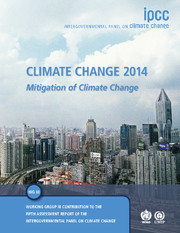 Climate Change 2014: Mitigation of Climate Change
Climate Change 2014: Mitigation of Climate Change Book contents
- Frontmatter
- Foreword, Preface, Dedication and In Memoriam
- Contents
- Summary for Policymakers
- Technical Summary
- Chapters
- Chapter 1 Introductory Chapter
- Chapter 2 Integrated Risk and Uncertainty Assessment of Climate Change Response Policies
- Chapter 3 Social, Economic, and Ethical Concepts and Methods
- Chapter 4 Sustainable Development and Equity
- Chapter 5 Drivers, Trends and Mitigation
- Chapter 6 Assessing Transformation Pathways
- Chapter 7 Energy Systems
- Chapter 8 Transport
- Chapter 9 Buildings
- Chapter 10 Industry
- Chapter 11 Agriculture, Forestry and Other Land Use (AFOLU)
- Chapter 12 Human Settlements, Infrastructure, and Spatial Planning
- Chapter 13 International Cooperation: Agreements & Instruments
- Chapter 14 Regional Development and Cooperation
- Chapter 15 National and Sub-national Policies and Institutions
- Chapter 16 Cross-cutting Investment and Finance Issues
- Annexes
- Index
Chapter 4 - Sustainable Development and Equity
from Chapters
Published online by Cambridge University Press: 05 February 2015
- Frontmatter
- Foreword, Preface, Dedication and In Memoriam
- Contents
- Summary for Policymakers
- Technical Summary
- Chapters
- Chapter 1 Introductory Chapter
- Chapter 2 Integrated Risk and Uncertainty Assessment of Climate Change Response Policies
- Chapter 3 Social, Economic, and Ethical Concepts and Methods
- Chapter 4 Sustainable Development and Equity
- Chapter 5 Drivers, Trends and Mitigation
- Chapter 6 Assessing Transformation Pathways
- Chapter 7 Energy Systems
- Chapter 8 Transport
- Chapter 9 Buildings
- Chapter 10 Industry
- Chapter 11 Agriculture, Forestry and Other Land Use (AFOLU)
- Chapter 12 Human Settlements, Infrastructure, and Spatial Planning
- Chapter 13 International Cooperation: Agreements & Instruments
- Chapter 14 Regional Development and Cooperation
- Chapter 15 National and Sub-national Policies and Institutions
- Chapter 16 Cross-cutting Investment and Finance Issues
- Annexes
- Index
Summary
Introduction
4.1.1 Key messages of previous IPCC reports
This chapter seeks to place climate change, and climate change mitigation in particular, in the context of equity and SD. Prior IPCC assessments have sought to do this as well, progressively expanding the scope of assessment to include broader and more insightful reflections on the policy-relevant contributions of academic literature.
The IPCC First Assessment Report (FAR) (IPCC, 1990) underscored the relevance of equity and SD to climate policy. Mandated to identify “possible elements for inclusion in a framework convention on climate change”, the IPCC prominently put forward the “endorsement and elaboration of the concept of sustainable development” for negotiators to consider as part of the Convention's Preamble. It noted as key issues “how to address equitably the consequences for all” and “whether obligations should be equitably differentiated according to countries' respective responsibilities for causing and combating climate change and their level of development”. This set the stage for the ensuing United Nations Framework Convention on Climate Change (UNFCCC) negotiations, which ultimately included explicit appeals to equity and SD, including in its Preamble, its Principles (Article 2), its Objective (Article 3), and its Commitments (Article 4).
The IPCC Second Assessment Report (SAR) (IPCC, 1995), published after the UNFCCC was signed, maintained this focus on equity and SD. It reflected a growing appreciation for the prospects for SD co-benefits and reiterated the policy relevance of equity and SD. It did this most visibly in a special section of the Summary for Policymakers presenting “Information Relevant to Interpreting Article 2 of the UNFCCC”, including “Equity and social considerations” and “Economic development to proceed in a sustainable manner”. Notably, the SAR added an emphasis on procedural equity through a legitimate process that empowers all actors to effectively participate, and on the need to build capacities and strengthen institutions, particularly in developing countries.
- Type
- Chapter
- Information
- Climate Change 2014: Mitigation of Climate ChangeWorking Group III Contribution to the IPCC Fifth Assessment Report, pp. 283 - 350Publisher: Cambridge University PressPrint publication year: 2015
- 6
- Cited by


